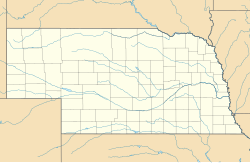Flatiron Hotel
Flatiron Hotel | |
 View from the east, near junction of St. Mary's Avenue and Howard Street | |
| Location | 1722 St. Mary's Avenue, Omaha, Nebraska |
|---|---|
| Coordinates | 41°15′19.2″N 95°56′22.1″W / 41.255333°N 95.939472°W |
| Built | 1912 |
| Architectural style | Georgian Revival |
| NRHP reference No. | 78003403 |
| Added to NRHP | 1978 |
The Flatiron Hotel is located at 1722 St. Mary's Avenue in downtown Omaha, Nebraska. Designed by architect George Prinz and originally constructed in 1912 as an office building, in 1914 it was renovated for use as a hotel. Today the building serves as office and commercial space. It formerly housed an upscale restaurant, the Flatiron Cafe, which closed in 2022.[1] The Flatiron Hotel was added to the National Register of Historic Places in 1987.
About
[edit]Drawing upon the original Flatiron Building in New York City, Augustus F. Kountze, a local banker and landowner, had the building erected as commercial and office space in 1912.[2] The building, designed in the Georgian Revival style, is one of Omaha's most distinctive buildings.[3] It has four stories with a circular tower at the point of the triangle, and is highlighted by decorative brickwork. There is limestone trim around the entire building, with a brown brick exterior on the whole building.[3]
In Popular Culture
[edit]In the novel Kings of Broken Things by Theodore Wheeler, the Flatiron Hotel is the site of a criminal scheme to dig secret tunnels that connect reputable hotels to brothels. The novel depicts several criminal endeavors connected to noted crime and political boss Tom Dennison.
See also
[edit]References
[edit]- ^ "Tax incentive program projects,"[usurped] Nebraska State Historical Society. Retrieved 9/30/07.
- ^ "Nebraska national register sites in Douglas County,"[usurped] Nebraska State Historical Society. Retrieved 9/30/07.
- ^ a b Gerber, K. and Spencer, J.S. (2003) Building for the Ages: Omaha's architectural landmarks. Landmarks, Inc. p 132.
- Hotel buildings completed in 1912
- Office buildings completed in 1912
- Omaha landmarks
- National Register of Historic Places in Omaha, Nebraska
- History of Downtown Omaha, Nebraska
- Defunct hotels in Omaha, Nebraska
- Kountze family
- Hotel buildings on the National Register of Historic Places in Nebraska
- 1912 establishments in Nebraska
- Flatiron buildings
- Triangular buildings



